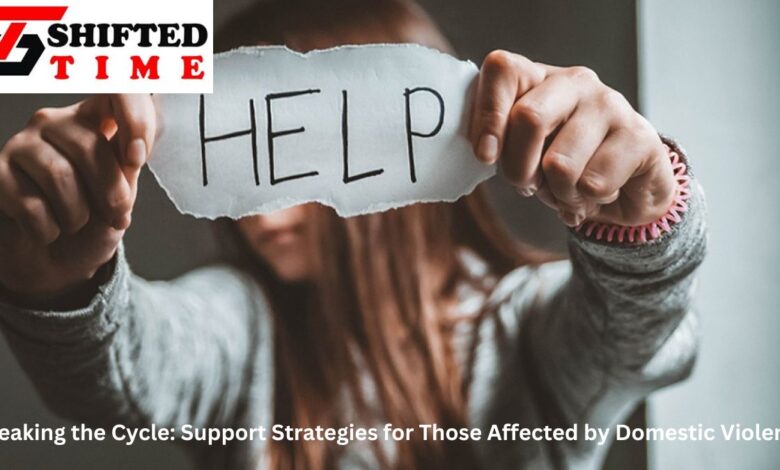Breaking the Cycle: Support Strategies for Those Affected by Domestic Violence

· Understanding the deep-seated psychological impacts of domestic violence.
· The role of community efforts in prevention and support.
· Legal avenues for protection and the significance of specialized legal advice.
· Emotional and physical aspects of creating secure environments for victims.
· The healing power of support groups and professional counseling.
· Rebuilding personal boundaries and fostering self-empowerment.
· Strategies for sustainable recovery and the importance of long-term support.
Domestic violence is a critical social issue that extends beyond the immediate danger to profound effects on mental health and well-being. Beyond the immediacy of physical security, comprehensive support involves legal assistance, emotional healing, and community solidarity. It’s critical to approach this with care, guiding without promoting services. An example is seeking the help of a domestic abuse lawyer Hernando County FL, which can be a decisive step towards protecting and asserting one’s rights. Through understanding and action, we can contribute significantly to breaking the cycle of abuse.
The Psychology Behind Domestic Violence: Recognizing Patterns and Impact
Domestic abuse frequently has a significant and long-lasting psychological effect on both the victim and the abuser. Victims may experience a range of emotional disturbances, including anxiety, depression, and post-traumatic stress. These reactions stem not only from the physical incidents of violence but also from the ongoing emotional manipulation and fear. A more profound comprehension of these psychological impacts can guide our societal approach to interventions and support systems to halt this cycle and begin healing.
Community Efforts: Rallying Support and Awareness
At the heart of prevention and recovery is the community’s response to domestic violence. It takes a concerted effort to increase awareness, reduce stigma, and promote assistance for those in need. Many communities have initiated programs that serve as beacons of hope for individuals affected by domestic violence, highlighting that they are not alone. These programs range from emergency shelters to educational workshops to empower victims and inform the public. Recent news stories underscore successful community-driven initiatives, inspiring others to take action and provide support for those entangled in abusive relationships.
Legal Protections and Resources
Navigating the legal landscape is another critical aspect of the support required for victims of domestic violence. Legal protections such as restraining orders can be life-saving, yet obtaining these measures can be daunting. A domestic abuse lawyer provides specialized guidance in understanding rights and the steps necessary for protection. For those grappling with complex legal issues, recent news articles about the progress in laws and resources offer reassurance that legal systems are evolving to address better and protect the victims of domestic violence.
Creating A Safe Space: Physical and Emotional Considerations
The journey out of an abusive situation often begins with the creation of a safe space. It means a location where the victim feels physically secure and is conducive to emotional recovery. Creating such spaces requires thoughtful consideration—a blend of access to immediate physical safety and long-term housing solutions. Simultaneously, emotional safety is about building trust and stability, allowing the victims to express their feelings and start healing without fear of repercussions or further harm.
The Role of Support Groups in Healing
Finding solidarity in shared experiences can be transformative for victims of domestic violence. Support groups and therapeutic interventions provide spaces for communal healing, where individuals can connect with others who have also endured abuse. These groups, which frequently include professional counselors and therapists, offer emotional support and coping strategies. They remind victims that their experiences do not define them but can emerge strengthened and supported by their community.
Strengthening Personal Boundaries and Self-Empowerment
The restoration of personal boundaries is a vital aspect of the recovery process for survivors of domestic violence. Establishing and maintaining these boundaries is often coupled with the challenge of regaining control and empowerment over their lives. Supportive therapy, education, and community programs can play instrumental roles in this regard, as they all equip individuals with the tools and confidence required to assert their rights and make decisions in their best interest. This reinforcement of personal agency is critical in the move toward a future free from abuse.
Moving Forward: Long-Term Recovery and Support
Acknowledging that recovery from domestic violence is a long-term endeavor is essential. Sustainable recovery means implementing support systems that cater to survivors’ evolving needs. It takes a robust network of friends, family, professionals, and community resources to foster a supportive environment over time. Consistent participation in therapeutic practices and ongoing legal and financial guidance are foundational to restoring normalcy and ensuring that the survivor feels comprehensively supported in a safer and healthier future.




